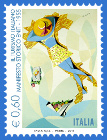DESTINATIONS
CONTACT US
CONTACTS
Enjoy the South
"If the landscape of human emotion were to exist in country, it would be in Italy."
The South of Italy is a joy to discover. You can explore charming villages which cling precariously to the slopes amid expanses of lemon groves. Surprise yourself discovering the Greek theatres and the Baroque towns and the conical Trulli houses surrounded by vast olive groves.
Travel with us through the South, send us an email with your ideas. One of our expert consultants will be at your disposal to take care of your travel logistics (hotel reservations, first class train tickets, airport transfers, restaurant reservations, and wine degustation), or someone seeking an in-depth travel experience by booking half day or full day tours with our expert local guides and drivers, our travel consultants will offer you a special and exclusive tour whenever and wherever you like to be.
SOUTHERN ITALY
Campania, Apulia, Basilicata, Calabria
Campania, Apulia, Basilicata, Calabria
The Forum with Vesuvius in the distance. Naples is the most visited city in the area, and the ruins of Pompeii are the most visited sights. Other important tourist destinations include the Amalfi Coast and Ravello, Apulia, which includes the historic town of Lecce and villages composed of trulli, and the beaches and sights of Calabria.
CAMPANIA
It marks the real beginning of the Italian South. It's easily accessible from Rome and home to some of the area's most notable features - Roman sites, spectacular stretches of coast, tiny islands. It's always been a sought-after region, first named by the Romans, who tagged it the "happy land and settled down here in villas and palatial estates that stretched right around the Bay of Naples.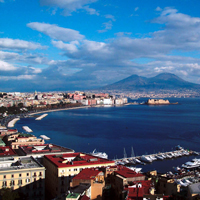 NAPLES is dense enough in interest to occupy you for a week: the ancient sites of Pompeii and Herculaneum Italy's best-preserved and most revealing Roman remains; the islands, Capri, Ischia. Capri swarms with visitors but is so beautiful that it's a shame to come to the area and miss it, while Ischia, which is the largest island, is a lively and attractive place in which you could while away an entire holiday.
NAPLES is dense enough in interest to occupy you for a week: the ancient sites of Pompeii and Herculaneum Italy's best-preserved and most revealing Roman remains; the islands, Capri, Ischia. Capri swarms with visitors but is so beautiful that it's a shame to come to the area and miss it, while Ischia, which is the largest island, is a lively and attractive place in which you could while away an entire holiday.
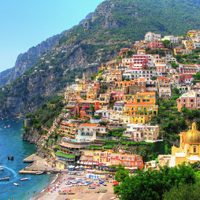 SORRENTO, is a major destination, and as cheery and likeable a resort as you'll ever visit; the Amalfi Coast, across the peninsula, is perhaps Europe's most dramatic stretch of coastline, whose enticing and sometimes exclusive resorts – Positano and Amalfi - need little introduction. Further south, the lively port of Salerno gives access to the Hellenistic site of Paestum and the relatively uncrowded.
SORRENTO, is a major destination, and as cheery and likeable a resort as you'll ever visit; the Amalfi Coast, across the peninsula, is perhaps Europe's most dramatic stretch of coastline, whose enticing and sometimes exclusive resorts – Positano and Amalfi - need little introduction. Further south, the lively port of Salerno gives access to the Hellenistic site of Paestum and the relatively uncrowded.
PUGLIA
It is the long strip of land with clean seas and reliable sunshine are the draws for holiday-makers both Italian and foreign. There's plenty of architectural interest in Puglia, as each ruling dynasty left its own distinctive mark on the landscape. Most distinctive are the kasbah-like quarters of many towns and cities, a vestige of the Saracen conquest of the ninth century, the one at Bari, while the Baroque exuberance of towns like Lecce are testament to the Spanish legacy. You will visit the forested Gargano promontory, sandy beaches and beautiful sea caves to swim in.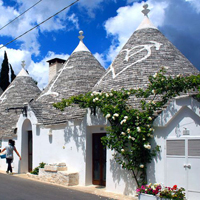 ALBEROBELLO, the fairyland, will meet you with its Trulli - little Kremlins declared World Heritage by Unesco - and its museum of wine and the territory. Here experts oenologist will explain the various production processes, from harvesting to bottling, and the evolution of pugliese vineyards. Visit also Locorotondo, with its typical round shape, concentric lanes and terraced whitewashed houses. Tasting of extra virgin oil in a "Slow Food" masseria matched with local homemade products.
ALBEROBELLO, the fairyland, will meet you with its Trulli - little Kremlins declared World Heritage by Unesco - and its museum of wine and the territory. Here experts oenologist will explain the various production processes, from harvesting to bottling, and the evolution of pugliese vineyards. Visit also Locorotondo, with its typical round shape, concentric lanes and terraced whitewashed houses. Tasting of extra virgin oil in a "Slow Food" masseria matched with local homemade products.
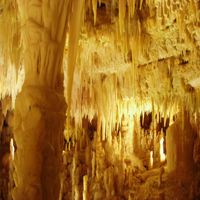 CASTELLANA GROTTE and its territory dotted with dolinas, grottoes and chasms; visit to the most important of them, the grottoes discovered in 1938. Polignano a Mare with its historical centre, looking on the edge of a high reef riddled with grottoes; among them the most spectacular is the grotta Palazzese, that gives charming green-blue tonalities to the water. And finally Putignano, the village of the Three Hills, with one of the most important Carnivals in Italy.
CASTELLANA GROTTE and its territory dotted with dolinas, grottoes and chasms; visit to the most important of them, the grottoes discovered in 1938. Polignano a Mare with its historical centre, looking on the edge of a high reef riddled with grottoes; among them the most spectacular is the grotta Palazzese, that gives charming green-blue tonalities to the water. And finally Putignano, the village of the Three Hills, with one of the most important Carnivals in Italy.
BASILICATA
In Basilicata, the greatest draw is Matera, whose distinctive Sassi - cave-like dwellings in the heart of the town - give it a uniquely dramatic setting. In the northern part of the region, Melfi and Venosa are bastions of medieval charm with important relics from the Byzantine and Norman eras. Of the region's two coasts, the Tyrrhenian is most engaging, with spots like Maratea offering crystal-clear water, a bustling harbour, and opportunities to discover remote sea grottoes. The Ionian coast worth a visit for its ancient sites and ruins of Magna Graecia.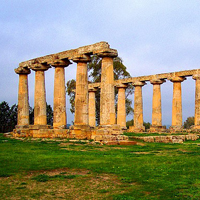 METAPONTO the ancient and glorious Achea colony founded in the 7th century BCE.Sightseeing of the sacred area, the three temples' remains and the theatre dedicated to Hera, the Doric Tavole Palatine is one of the best-preserved monuments of Magna Graecia. Visit the antiquarium and the ancient settlement of Heracleia. Discover the significant archaeological and art historical sites of southern Italy from remote antiquity through the Middle Ages.
METAPONTO the ancient and glorious Achea colony founded in the 7th century BCE.Sightseeing of the sacred area, the three temples' remains and the theatre dedicated to Hera, the Doric Tavole Palatine is one of the best-preserved monuments of Magna Graecia. Visit the antiquarium and the ancient settlement of Heracleia. Discover the significant archaeological and art historical sites of southern Italy from remote antiquity through the Middle Ages.
CALABRIA
Calabria has startling natural beauties and spectacular towns that seem to grow out of the craggy mountaintops. It has three national parks: the Pollino in the north, the Sila in the centre and the Aspromonte in the south. It's almost all hills, but skirted by some of Italy's finest coast resorts such as Scilla, Tropea and Capo Vaticano. Calabria, the cradle of Magna Graecia and land of ancient settlements, is full of splendid churches, monasteries, castles, palaces and towns where age-old traditions still survive.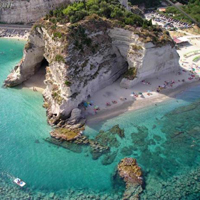
CAPO VATICANO is defined as one of the hundred most beautiful beaches in the world: a long tract of fine sand surrounded by age-old trees and lapped by crystal-clear water that teems with a variegated fish fauna. The wonderful Costa degli Dei is a paradise for water sports. Underwater excursions offer the chance to see unique seafloors and beautiful sea fauna.
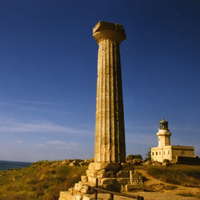
CROTONE According to Ovid's legend, the capital owes its name to Hercules: the half-god, returning from one of his mythological labors, wanted to honor his friend Crotone, accidentally injured to death by the hero himself. To repent for his grave mistake, Hercules constructed the city as a memorial. According to history, this is the city of the Greek school founded by Pythagoras.


